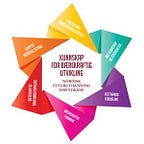Punavuori | Rödbergen Agreement
October 2018
Punavuori | Rödbergen Agreement
Awareness of the dilemmas related to our own unsustainable practices and sustainable education, our network elaborated guidelines for our meetings in Helsinki in the Punavuori | Rödbergen district in October 2018.
We hope to inspire other international (NVL) networks concerning their own network practices.
In short the dilemma can be put like this:
“The people with the highest educations in the world are also the ones with the largest ecological footprints.“ (Former student Nordisk Bærekraft, J. Fredenberg)
We all know the value of Nordic cooperation and of meeting in person to collaborate, but we must also reflect on the impacts of our travels. We in the NVL network on sustainable development asked ourselves how we can make our meetings have as little negative impact as possible and as much positive impact as possible on the environment and communities near and far?
Our guidelines are optional and a reminder to us to continuously actualise and discuss in our network. You can see the latest version here.
Guidelines we have chosen to adopt for our network meeting practices:
· We will explore options for travel other than flying, see: https://www.klimatsmartsemester.se/. We will explore possibilities of meeting while travelling, for example on a ferry. We will set the time and date for the meeting to make it easier to travel sustainably; i.e. checking ferry and train timetables so the meeting fits with them.
· We will consider carefully the reasons and purpose of every meeting and where we meet. Is there a place to meet that is central so the least distance has to be travelled?
· We will reevaluate how many physical meetings are necessary per year, explore the possibility of having some meetings online, encourage NVL to host online meetings, and consider having fewer but longer physical meetings.
· We will calculate the carbon footprint of our flights and use network funds to pay for carbon sequestration. Atmosfair is one such fund for climate change mitigation: https://www.atmosfair.de/en/
· We will patronize environmentally certified accommodations where possible. Sometimes smaller hotels or guesthouses are not certified due to expense, so ask about their environmental policies and practices and choose them if they are working to reduce their impact.
· We will try to stay and eat at places with a social, local and environmental profile.
· We want to contribute in a practical way to the local community during our meetings. The local host can help to identify the local needs and possibilities for contributing, ex. planting trees, doing a clean-up, etc. We want to remind ourselves that doing something practical together is actually a great learning experience for our networks. We will explore calculating our handprint — a measure of our positive actions towards sustainability. See here: http://handprint.in/
· We will continue to be self-critical to make sure we are in fact working for the U.N. Sustainable Development Goals and the Nordic Generation 2030 as we say we are.
